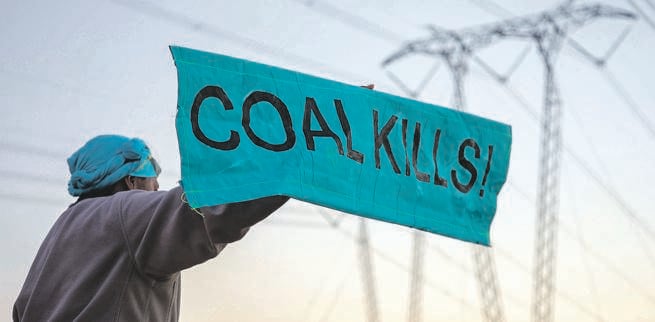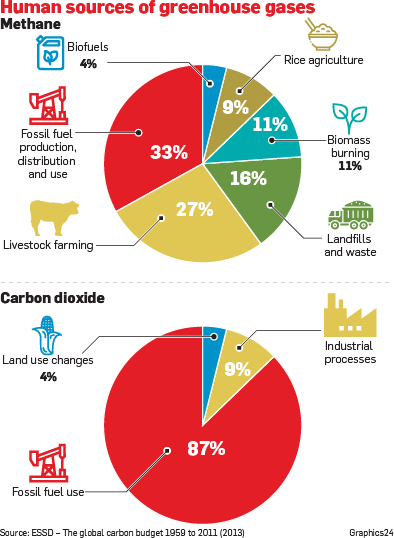
Two major reports and a recent scientific paper provide evidence that underpins climate activism on Africa Day, writes Mandi Smallhorne
In the past year or two there’s been a sense that the climate crisis, which threatens all life on this planet, has been accelerating to a panicky gallop.
Two recent reports added substance to our lived experience of droughts, heatwaves, floods and fires: The Intergovernmental Panel on Climate Change’s special report late last year, which warned we had only a few years to reduce our greenhouse gas emissions by 45% or face disaster; and the global assessment report of the Intergovernmental Science-Policy Platform on Biodiversity and Ecosystem Services, which told us that an unprecedented extinction rate threatened 1 million of Earth’s species.
The bad news has filled activists with a sense of urgency. Groups all over Africa protested on Africa Day – yesterday – under the banner of AfricaVuka (Africa Rise).
More than 30 events took place in countries as far apart as Senegal and South Africa, demanding “real change for a fossil-free Africa”.
Since Africa has rich mineral resources, much of the protest was focused on coal mining.
Edwin Fanta Mumbere of the Centre for Citizen Conservation in Uganda used the opportunity to air documentaries about the effects of coal.
“Uganda [has] started the exploration of oil and gas in Hoima and the Ngaji Block, within the ecosystem area of Queen Elizabeth National park, and the government has planned to license other areas, which is a great risk to our environment.”
Paul Mutuku, education officer at Karara in Nairobi, protested against the health, social and environmental effects of coal.
He said coal mining and exploitation resulted in displaced communities and degraded environments.
It was also “demanding of water” – a red flag for a country such as Kenya, where drought in the northwest has left a million people facing starvation.
Michael David Terungwa from Gisep, in Nigeria, said: “The people who mobilised for AfrikaVuka are demanding a rapid phase-out of fossil fuel energy.
“Despite overwhelming evidence that continued fossil fuel use is killing the planet and many of us with it, investors appear dead set on enriching themselves at the expense of billions of people. Those in power are doing nothing to stop this madness and are instead adding to it, claiming that more coal-fired power stations in Lamu, an official Unesco Heritage site, and oil exploration in the Democratic Republic of Congo’s Virunga National Park, a biodiversity hot spot, to name but a few, are going to be good for development. We ask them: ‘Whose development, exactly?’ There is a path for a just development that puts people, their safety and the resilience of the environment we all rely on at the centre,” he said.
New information
The demand for a transition from fossil fuels is supported by a paper published in Earth and Space Science on February 5.
It contains information that might go some way towards explaining the sense that things are speeding up uncomfortably and that we need to take urgent action.
The paper looks at the rate of methane emissions in recent years. Methane, of course, is a greenhouse gas; you’ll know that from the ongoing push for people to eat less meat because cows fart methane (actually, they burp it – but that’s a story for another day).
And it’s pretty nasty stuff, methane: Particle for particle, it has 30 times the warming power of the big greenhouse gas, CO2.
Its saving grace is that it lingers in the atmosphere for only about 12 years, while CO2 can stick around for hundreds, even thousands, of years.
Increases in methane emissions have nosed upwards at a pretty steady rate for decades. Then, all of a sudden, in 2007, the gas took off, soaring up at an unprecedented rate, accelerating in 2014 to 2017 (the last year for which the authors crunched data).
Where does methane come from?
There are several sources, and, contrary to popular mythology, livestock is big, but not the biggest one.
The fascinating thing about methane is that (due to chemical science that you don’t want to read on a Sunday) scientists can figure out roughly from its chemical fingerprints where it comes from: a microbial source (wetlands or ruminants’ tummies, for example) or fossil fuel production – yes, mining coal, oil and gas produces methane.
“In coal formation, pockets of methane get trapped around and within the rock. Coal mining-related activities (extraction, crushing, distribution) release some of this trapped methane,” writes whatsyourimpact.org.
Biomass burning includes burning to clear bush for farming – the researchers found methane in smoke rising from agricultural fires around Lake Victoria and in northern Uganda.
They also found methane plumes spiralling off wetlands in Uganda and Zambia, a product of microbes chewing up organic matter (leaves, algae and the like).
Cristian Gudasz, a postdoctoral research associate in Princeton’s department of ecology and evolutionary biology, was co-author on a 2014 paper in Nature that suggests methane emissions from freshwater systems will soar as things get hotter.
This is a feedback mechanism, a vicious cycle: The higher the temperatures get (driven by increasing methane) the less able the natural chemicals in the air are to break down the methane. This could spell nasty trouble for life on this planet.
Fossil fuel production is the biggest source of methane, so it’s a fair target for activists: Stop mining for fossil fuels before it starts, wean off it by transitioning to less dangerous sources, such as renewables, and you’re making an impact.
There’s still a lot of work to be done in pinning the majority share of blame for the methane spike on any specific cause, but it seems clear that a spike in this frightening gas is at least partly behind the recent sense of acceleration of more extreme weather, higher daytime temperatures, bigger and nastier wildfires.
Since fossil fuel production and use are the top triggers of two critical greenhouse gasses, it makes sense for activists in Africa to target them, whether it’s with a march, a rally or a sophisticated campaign targeting the African Development Bank.
This is a coalition led by African Climate Reality Project, called Zero Emissions/Omissions, that presented a petition to the bank on Friday, aimed at closing the door on fossil fuel finance and opening the doors to more transparent, accessible information on energy finance and investment.
What’s at stake? Food security; infrastructure maintenance and development; public health; economic prosperity; and much more.
Landry Ninteretse, regional team leader for 350Africa.org, which was a leader in the AfricaVuka protests, reminds us of the climate crisis-related blows Africa has taken in recent months: Cyclone Idai and Kenneth lashing Mozambique, Malawi, Tanzania and Zimbabwe, droughts and floods in KwaZulu-Natal and the Eastern Cape, Namibia declaring a drought disaster with close to 65 000 cattle dead, 1 million people facing hunger in northwest Kenya.
“With the exception of South Africa, African countries have done relatively little to contribute to climate crisis yet are being severely affected and have little to no resources to cope with the aftermath,” he said.
“Less developed African countries are a natural disaster away from sinking into a negative loop of poverty and lack of access to social and economic opportunities, exacerbated by climate crisis.”
SMS us on 35697 using the keyword CLIMATE and tell us what you think. Please include your name and province. SMSes cost R1.50. By participating, you agree to receive occasional marketing material




 Publications
Publications
 Partners
Partners









